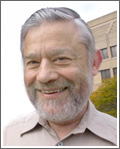|  Dr. Manuel BLUM Dr. Manuel BLUM
Bruce Nelson Professor of Computer Science, Carnegie Mellon University
1995 Turing Award Recipient
美国卡内基·梅隆大学计算机科学教授
1995年图灵奖获得者
http://www.cs.cmu.edu/~mblum/
BIO:
Manuel Blum, the Bruce Nelson Professor of Computer Science at Carnegie Mellon University, is a pioneer in the field of theoretical computer science and the winner of the 1995 Turing Award in recognition of his contributions to the foundations of computational complexity theory and its applications to cryptography and program checking, a mathematical approach to writing programs that check their work.
He was born in Caracas, Venezuela, where his parents settled after fleeing Europe in the 1930s, and came to the United States in the mid-1950s to study at the Massachusetts Institute of Technology. While studying electrical engineering, he pursued his desire to
understand thinking and brains by working in the neurophysiology laboratory of Warren S. McCulloch and Walter Pitts, then concentrated on mathematical logic and recursion theory for the insight it gave him on brains and thinking. He did his doctoral work under the supervision of Artificial Intelligence pioneer Marvin Minsky, and earned a Ph.D. in mathematics in 1964.
He began his teaching career at M.I.T. as an assistant professor of mathematics and, in 1968, joined the faculty of the University of California at Berkeley as tenured associate professor of electrical engineering and computer sciences. He was named the Arthur J. Chick Professor of Computer Science in 1995. Dr. Blum accepted his present position at Carnegie Mellon in 2001. The problems he has tackled in his long career include, among others, methods for measuring the intrinsic complexity of problems. Blum's Speedup theorem is an important proposition about the complexity of computable functions. The Blum axioms give a machine-independent way to understand the complexity of computation, whether that computation is done by human or by computer.
A member of the National Academy of Science and the National Academy of Engineering, he is a fellow of the American Academy of Arts and Sciences, the American Association for the Advancement of Science, and the Institute of Electrical and Electronics Engineers. Dr. Blum has held a Sloan Foundation Fellowship and received a University of California at Berkeley Distinguished Teaching Award and Sigma Xi's Monie A. Ferst Award, among other honors. He is the author of more than 50 papers published in leading scientific journals and has supervised the theses of 30 doctoral students, many of whom are today's leaders in the field.
Presentation Title: Machine Understanding / Thinking Out of the Box
Abstract:
Machine Understanding: Machine Learning is a well-researched area of computer science. It has many applications from helping stem the current flood of email spam to recognizing objects in visual images.
Manuel will present a new area -- currently under construction -- which we call Machine Understanding. The goal of Machine Understanding is to make Machine Learning more robust by extending it to high-level (abstract) relationships between learned concepts. In our approach, a machine understands material by searching for and detecting significant properties of what it is studying, attaching names (mnemonics) to those properties, preparing templates (models) for future use, then continuing recursively to build on this foundation.
To give an idea how this works, we will look at Freudenthal's LINCOS (LINgua COSmica), a language designed for communication with extraterrestrial beings. These beings are presumed to be intelligent aliens who have no other knowledge of our world or language except what is conveyed by LINCOS itself. We discuss the design of a program/computer that can learn on its own to understand any language such as LINCOS that is designed to be inferable by an intelligent motivated but otherwise unknowledgeable entity.
This is joint work with Ryan Williams.
Thinking Out of the Box: What does it mean to think out of the box? How is it done? What are some examples? Yun Ying, a semi-retired physics professor in Nanjing has been promoting out-of-the-box thinking in her physics classes, see:
http://www.sciencemag.org/cgi/content/full/317/5834/74b
Lenore will discuss our own experience with promoting out-of-the-box thinking, both in education (with examples from CS4ALL, a program for high school (and K-8) teachers of computer science) and in the research arena (with examples from the ALADDIN Center which promotes synergy between algorithm theory and practice). |